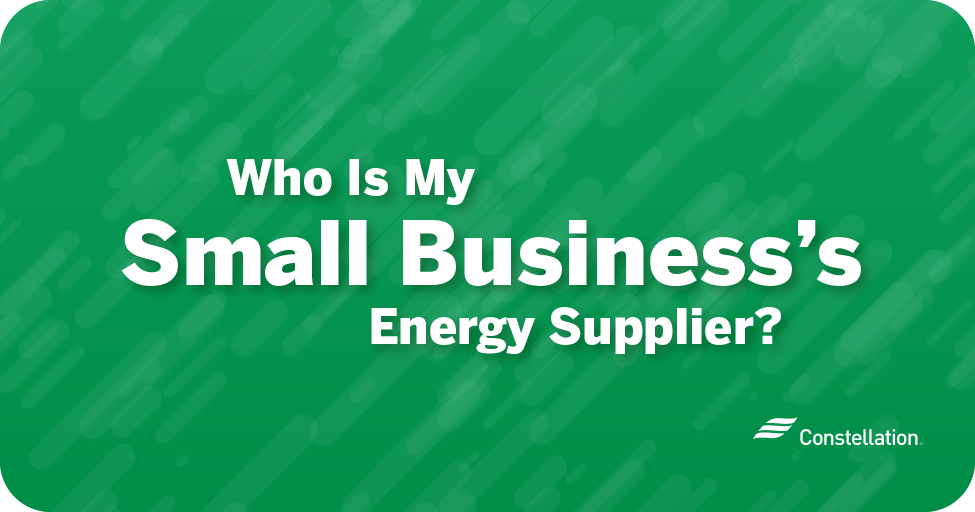If your small business is like most, a reliable, affordable supply of energy is critical to its success. But do you know what energy company services your business? Whether you’re moving or just reviewing expenses, it’s important to check who your business energy provider is so you can take more control over your energy usage and costs.
But how you check who your business energy provider is may vary depending on where your business is located. Some states designate one utility company to a given region, while others allow business owners a choice of whom they purchase their energy from. So, you may end up having some decisions to make regarding who your business energy supplier is. And the better you understand what your business energy supplier is in charge of, the better decision you’ll make for your small business.
The role your business’s energy provider plays
An energy provider or supplier is responsible for a few distinct aspects of energy production and distribution. For example, your small-business energy provider:
- Purchases or generates energy. Some business energy providers will purchase energy wholesale and resell it to their customers, while other providers will generate the energy they sell.
- Works alongside utility companies. If a supplier does generate their own energy, they’ll likely use the local utility company’s power lines to distribute it to customers.
- Determines your energy price. Your business energy provider is also in charge of setting your energy price and billing you based on your kilowatt-hour usage. That’s why it’s important to understand what a kilowatt-hour is and how your business uses energy.
Although they may work together, there are some key differences between energy suppliers and utilities. For example, your utility company handles the distribution of your energy and maintains the overall power grid. By contrast, your business energy supplier sets your energy costs as well as the terms and conditions of your contract.
Can you pick who your small business’s energy supplier is?
Most states have a regulated energy market, meaning one utility company services all the homes and businesses in a particular area. So, who your small-business energy supplier is will primarily depend on where your business is located. However, this is not the case in every state. For example, states like Texas and Pennsylvania have turned to energy deregulation as a way to give residents and business owners more say in where their energy comes from.
In a deregulated energy market, customers have the ability to compare different suppliers and pick the one that best meets their needs. This is what’s known as energy choice. With choice, competition between providers is increased, which can lead to improved service and more affordable rates for customers.
Determining who your business’s energy supplier is
It’s important to know who supplies energy to your small business, as well as what kind of energy plan it has. This information allows you to get a better understanding of the service you’re receiving and can help you determine whether you’re satisfied with it.
There are a few different ways to find your business energy supplier:
Check your most recent energy bill.
If you’ve been at the same location for at least a month, you can check who your business energy provider is by referring to your most recent bill. Their name should be listed on the statement along with a breakdown of your monthly charges. Reading through each of these charges can help you understand your energy costs and where they come from.
It’s possible that both an energy supplier and utility company service your location. In that case, your business energy provider should be listed near the “supply charges” section of your bill.
Ask the building’s previous owner or landlord.
Another way to find your business energy supplier is to check with the building’s previous owner or landlord. They’ll be able to get you in contact with the utility company for your area, or let you know if you get to choose your own energy supplier. This can be helpful if you’re moving into a new building and/or area.
Check with your distribution company.
Distribution companies often work alongside energy suppliers to generate and deliver the energy you use. So, your local distribution company may be able to help you find out what energy company services your business. Or you could also try checking with the regulatory commission in your state.
Contact your local government.
If you’re still unable to find your business energy supplier, you can reach out to city hall or other local government officials. They’ll likely have more information about which utility companies and energy suppliers are currently operating in your area. Additionally, your local government can let you know if your area participates in energy choice.
Deciding where to get energy for your small business
Since there are several states that still have a regulated energy market, you may not have a say in what energy company services your business. But even if you can’t shop around for the lowest rate, you can still monitor your small-business energy usage and find other ways to cut energy costs.
If you are able to decide who your business energy supplier is, you’ll want to do some research first. Taking the time to compare your small-business energy options is the only way to ensure that you get the service you need at a price you can afford.
